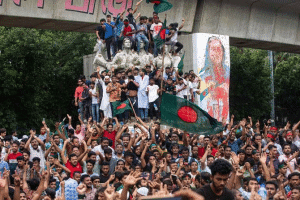PNN – In a report, the Associated Press news agency has discussed how the protests of Bangladeshi youth affected the political arena and the fall of the government of Sheikh Hasina, the resigned Prime Minister of this country.
According to the report of Pakistan News Network, the Associated Press wrote in this report on Monday: Students first took to the streets of Bangladesh in June to demand an end to laws that reserved up to 30 percent of government jobs for the children of war-wounded soldiers who fought in the country’s 1971 war of independence from Pakistan.
According to this American media, the protesters believed that this was for the benefit of the supporters of Hasina’s “Awami League” party, who led this struggle and were part of the elite of Bangladesh. Under this plan, the quota for marginalized groups was such that only 44 percent of civil service jobs were awarded on merit.
The continuation of this news agency’s report on the developments of Bangladesh this week is as follows:
It was no accident that such jobs were at the center of the movement. These jobs have the best incomes and are among the most stable jobs in a country whose economy has prospered in recent years. But not enough professional jobs have been created for the educated middle class.
It was not surprising that Generation Z led this uprising. Among them were young people who were frustrated and affected by the lack of opportunities in Bangladesh. At the same time, they do not adhere to taboos and old traditions that the quota system reflected.
Their willingness to break with the past became apparent when Hasina downplayed their demands in mid-July, asking them that if freedom fighters should not get government jobs, then who should get them?

Hasina said, using a highly offensive word for Bangladeshis, referring to those who collaborated with Pakistan to suppress the independence movement: “Who? The grandchildren of the “volunteers”?”
But the student protesters wore it as a badge of honor. “Who are you?” they chanted during a march on Dhaka University campus. who am I volunteer Who said this? Dictator.”
The next day, protesters were killed during clashes with security forces. This issue provoked demonstrations, which turned into a wider uprising against Hasina’s government.
Bangladesh’s longest-serving prime minister was proud of increasing per capita income and turning Bangladesh’s economy into a global competitor; Farms turned into garment factories and bumpy roads turned into winding highways.
After graduation, many young people try to study abroad or migrate abroad in the hope of finding a suitable job, which destroys the middle class and leads to brain drain. Despite these problems, it seems that none of the protesters really believed that their movement could remove Hasina from power.
Some of that euphoria is now gone, as the enormity of the work ahead becomes clear. Nobel laureate Muhammad Yunus became Bangladesh’s interim leader on Thursday and, along with a cabinet that includes two student protest leaders, must restore peace and prepare the country for new elections.
The hope of most students is that the interim government will take time to reform Bangladesh’s institutions, while a new political party will be formed that will not be led by the old political dynasties.
The youth who took to the streets are often referred to as the “I hate politics” generation, when they don’t hate all politics, but the divisive politics in Bangladesh.

